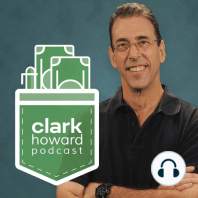73 min listen

7.29.19 More people are ditching home internet; Watch out for these fake charges; You might actually need flood insurance
7.29.19 More people are ditching home internet; Watch out for these fake charges; You might actually need flood insurance
ratings:
Length:
39 minutes
Released:
Jul 29, 2019
Format:
Podcast episode
Description
The cost of home broadband has gotten so expensive and more consumers are disconnecting home internet in favor of cell phone Wi-Fi. USA Today reports 40% are using cell phone internet exclusively now for service. They're finding that it works out fine. On cell phones, people don't have to worry about data overages. Some carriers may impose network management for those who've used a lot of data that month and find themselves in congested areas, by crawling service till the next billing cycle. But there's no overage. This is a great alternative to paying huge money to a cable monopoly for home internet service.
The simple scam hitting millions of us is an easy rip-off to watch out for. Consumer warning: What you don't notice on your monthly bills can cost you. While a big bank looked the other way, criminals stole untold hundreds of millions from consumers. The bank had sold all the credit card numbers in their portfolio to crooks who put fake charges through monthly for 3 years. The bank played dumb and 93% of consumers never noticed fake charges hitting them every single month. The worst part is that the criminals are heavily targeting debit card users. If you don't notice immediately a fraudulent debit, you don't have the rights that come with credit cards. The money is gone forever even if your bank acknowledges the fraud. You're out the money. It's up to you every month to look through credit and debit charges. If something doesn't look right - dispute it.
Much of the country has seen devastating flooding. Even outside federally designated flood zones there is risk. Facing that risk is vital. By FEMA's own admission, current flood maps are out of date and incomplete around the country. 3 additional factors: rising sea levels, development replacing ground cover with asphalt and increasingly severe weather patterns - are putting more properties at risk of flooding. The Midwest is suffering mightily from extreme flooding, devastating the lives and finances of many. The terms "1000, 500 and 100 year floods' refer to specific math formulas and are not to be taken literally. Be realistic. If you can see development above you, you could be a sitting duck for flooding, which regular insurance does not cover. Check prices at Floodsmart.gov. If you're in a low risk area, the premiums vs the coverage are reasonable - a few hundred a year in a low risk area for around $250,000 in coverage.
Learn more about your ad choices. Visit megaphone.fm/adchoices
The simple scam hitting millions of us is an easy rip-off to watch out for. Consumer warning: What you don't notice on your monthly bills can cost you. While a big bank looked the other way, criminals stole untold hundreds of millions from consumers. The bank had sold all the credit card numbers in their portfolio to crooks who put fake charges through monthly for 3 years. The bank played dumb and 93% of consumers never noticed fake charges hitting them every single month. The worst part is that the criminals are heavily targeting debit card users. If you don't notice immediately a fraudulent debit, you don't have the rights that come with credit cards. The money is gone forever even if your bank acknowledges the fraud. You're out the money. It's up to you every month to look through credit and debit charges. If something doesn't look right - dispute it.
Much of the country has seen devastating flooding. Even outside federally designated flood zones there is risk. Facing that risk is vital. By FEMA's own admission, current flood maps are out of date and incomplete around the country. 3 additional factors: rising sea levels, development replacing ground cover with asphalt and increasingly severe weather patterns - are putting more properties at risk of flooding. The Midwest is suffering mightily from extreme flooding, devastating the lives and finances of many. The terms "1000, 500 and 100 year floods' refer to specific math formulas and are not to be taken literally. Be realistic. If you can see development above you, you could be a sitting duck for flooding, which regular insurance does not cover. Check prices at Floodsmart.gov. If you're in a low risk area, the premiums vs the coverage are reasonable - a few hundred a year in a low risk area for around $250,000 in coverage.
Learn more about your ad choices. Visit megaphone.fm/adchoices
Released:
Jul 29, 2019
Format:
Podcast episode
Titles in the series (100)
Clark Howard: 02.14.17: Topics: Cardless ATM's having troubles; T Mobile deal!; Know your airport security rights; Disney costs rise; Aldi making big changes by The Clark Howard Podcast